Tax experts prescribe new institutions for Sri Lanka’s ailing tax system
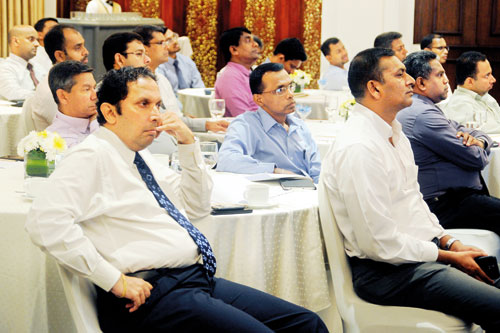
Members and invitees Pix by Amila Gamage
Sri Lankans are currently suffering from a confused mindset: the tax phobia has been widely spreading in the society as a result of the failure to create awareness on complex and complicated taxes by successive governments including the present Yahapalanya which made it worse and complex. Under the status of confusion now, no one likes to pay taxes, myself included although I am one of the non taxpayers in the country (based on my income) with a tax department handling 148,000 individual tax files and 48,000 corporate tax files.
However “taxes are the price we pay for a civilised society” and all the benefits of that society. But how do we collect taxes without properly legalising it? Is it proper to levy such taxes from the local taxpayers? This dislike of taxes has been aggravated to a total out-of-control phobia, making taxes similar to Satan’s work. The Sunday Times Business Club recently hosted two specialists on the subject, Suresh Perera and Shiran Fernando to diagnose the tax phobia and prescribe some remedies at its members meeting held at the Kingsbury hotel in Colombo on Tuesday.
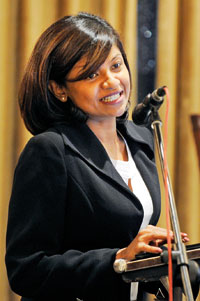
Dinithi Somaratne, Communications Director speaks on Kingsbury's new CSR philosophy
Mr. Perera, Principal, Tax & Regulatory – KPMG and a multidisciplinary professional specialising in taxation with an accounting, legal, company secretarial qualifications and practical experience, prescribed a tri-dosage for the current tax ailment. He stressed the need of improving the tax governance of Sri Lanka by introducing new institutions to the country’s tax system. The first is a Tax Ombudsman, and the second is an Independent Advanced Ruling Authority (IARA). The other remedy is to devise and implement a white paper on the country’s policy to create awareness on taxation.
The Tax Ombudsman should be created by an Act of Parliament and would be responsible for looking into complaints made by the taxpayers on the maladministration of the Department of Inland Revenue, he emphasised. These would include delayed tax refunds, delays in processing issues, probably due to the rudeness of the tax officers, etc. The concept provides the taxpayer with an institution to resolve issues caused by administrative roadblocks without resorting to tax litigation. He noted that a Tax Ombudsman’s role is not to get involved in technical interpretations of the law, it’s only the maladministration issues pertaining to the Inland Revenue Department.
“In Sri Lanka currently we have the ruling committee,” he said adding that as this committee consists of Commissioners from the Inland Revenue Department it cannot be considered to be independent. He stressed the need of an IARA that will improve the taxpayer’s confidence. For instance a business could approach the independent ruling authority and ask the tax consequences and then knowing the tax consequences before entering into a transaction, he said adding that this will improve the taxpayer confidence and will also eliminate disputes between the IRD and the tax payers.
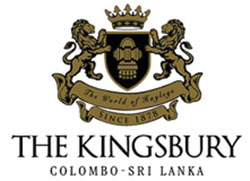 Outlining the current status of some of the taxes introduced or amended in 2016 budget, he disclosed that after the budget proposals 2016, four bills have been published, but are yet to be enacted by Parliament. They are Value Added Tax (VAT) Bill (13th September 2016) Nation Building Tax (NBT) Bill (19th August 2016) Land Lease Tax (LLT) Bill (02nd September 2016) and PAL. (Ports and Development Levy – 22nd July 2016). Further, for Income Tax (IT) and Economic Service Charge (ESC), no bills have been presented in the Parliament yet, but press notices have been published on 8th April 2016 which have been followed by the taxpayers.
Outlining the current status of some of the taxes introduced or amended in 2016 budget, he disclosed that after the budget proposals 2016, four bills have been published, but are yet to be enacted by Parliament. They are Value Added Tax (VAT) Bill (13th September 2016) Nation Building Tax (NBT) Bill (19th August 2016) Land Lease Tax (LLT) Bill (02nd September 2016) and PAL. (Ports and Development Levy – 22nd July 2016). Further, for Income Tax (IT) and Economic Service Charge (ESC), no bills have been presented in the Parliament yet, but press notices have been published on 8th April 2016 which have been followed by the taxpayers.
Relevant Gazettes have been issued on 1st January 2016 to abolish Stamp Duty on 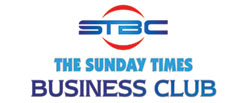 transfer of shares and on local credit card transactions. The Stamp Duty on usage of credit cards in any merchant country other than Sri Lanka will be increased to 2.5 per cent. Referring to the situation of VAT, he said, according to the latest VAT Bill issued, the VAT rate will be increased to 15 per cent from the date of passing the amendment in the parliament. Further the rate would prevail at 15 per cent for the period from 2nd May 2016 to 11th July 2016. For any period after 11th July 2016 up to the date on which the Bill is passed in the parliament, the rate will remain at 11 per cent. Confused? (So was I).
transfer of shares and on local credit card transactions. The Stamp Duty on usage of credit cards in any merchant country other than Sri Lanka will be increased to 2.5 per cent. Referring to the situation of VAT, he said, according to the latest VAT Bill issued, the VAT rate will be increased to 15 per cent from the date of passing the amendment in the parliament. Further the rate would prevail at 15 per cent for the period from 2nd May 2016 to 11th July 2016. For any period after 11th July 2016 up to the date on which the Bill is passed in the parliament, the rate will remain at 11 per cent. Confused? (So was I).
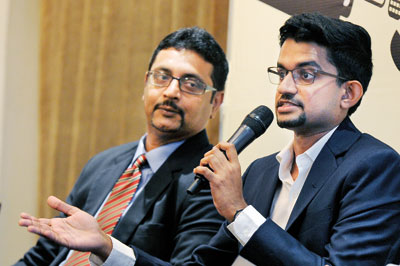
Suresh Perera and Shiran Fernando (right )
The threshold for VAT registration has been reduced to Rs.3 million per quarter with effect from 1st April 2016. However the threshold for wholesale and retail will be Rs.12.5 million per quarter from the date of passing the VAT Bill. The threshold currently prevailing for wholesale and retail would be Rs.100 million per quarter. The exemption which prevails for healthcare services has been narrowed down only to diagnostic tests, dialysis and OPD services excluding medical consultation services. The VAT exemption provided to healthcare services will be removed with effect from the date on which the Bill will be passed in the parliament and for the period 2nd May 2016 to 11th July 2016.
The VAT Bill has revoked the exemptions granted to the Telecommunication services Telecommunication services including services of issuing licenses for telecommunication which is now liable for VAT for the interim period 2nd May 2016 to 11th July 2016 to the date on which the Bill is legislated. Shiran Fernando, lead economist and senior product head of Frontier Research, noted that the money you pay in taxes goes to many places. In addition to paying the salaries of government workers, your tax money also helps to support common resources, and ensure the roads you travel on are safe and well-maintained. But in Sri Lanka the main challenge is to improve the country’s tax to GDP ratio, he said adding that there has to be additional tax collection to state coffers, should to improve this.
“The question is where should this additional tax revenue come from?” he asked. There should be ‘certainty’ and convenience of payment with regard to quantum and time of tax payment, he pointed out. Referring to several countries which have no tax systems, he pointed out that Dubai does not have comprehensive tax system, it has income tax decrees enacted by each emirate. In practice only foreign banks and oil companies are subject to income tax. It does not have indirect taxes such as VAT on turnover tax. Instead of indirect taxes Dubai gathers revenue by imposing levies on usage of infrastructure.
The STBC is looking for young and energetic members. Please email
bt@sundaytimes.wnl.lk
for information.


